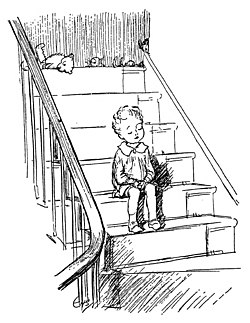"Halfway Down the Stairs"
A song was created from the poem by Harold Fraser-Simson, who put many of Milne's poems to music.
"Halfway Down the Stairs" was used in the first season of The Muppet Show . The performance was staged in the middle of a flight of stairs, and became the most significant performance of the season for Kermit the Frog's nephew Robin the Frog. The sequence was reshot for a few different countries' broadcast of the tenth episode, with guest Harvey Korman.
The song was included on the LP The Muppet Show and later released as a single (backed with Mahna Mahna ), which reached no. 7 on the UK Singles Chart in 1977. [3] The sequence was refilmed for inclusion in Top of the Pops . The track was also included on the CD The Best of The Muppets and the VHS Playhouse Video: Children's Songs and Stories.
Jerry Nelson, who served as Robin the Frog's performer, sang the song at Jim Henson's memorial service during a segment where various Muppet performers sang Henson's favorite songs as their characters.
Rowlf the Dog sang a cover of this song in his album, Ol' Brown Ears is Back . American singer Amy Lee of the band Evanescence sang a cover of the song which was included on the 2011 album Muppets: The Green Album . [4]
In 2019, a cover of this song was sung in the Family Guy episode "You Can't Handle the Booth!". In the episode, the show's main character Peter Griffin gets stuck in the banister slats of his staircase and dejectedly sings the song to pass the time. [5]
This page is based on this
Wikipedia article Text is available under the
CC BY-SA 4.0 license; additional terms may apply.
Images, videos and audio are available under their respective licenses.
